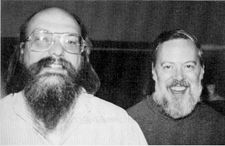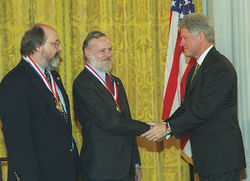Ken Thompson
| Kenneth Lane Thompson | |
|---|---|
 Thompson (left) with Dennis Ritchie.
|
|
| Born | February 4, 1943 New Orleans, Louisiana, USA |
| Fields | Computer Science |
| Institutions | Bell Labs Entrisphere, Inc Google Inc. |
| Known for | Unix B (programming language) Belle (chess machine) |
| Notable awards | Turing Award National Medal of Technology Tsutomu Kanai Award |
Ken Thompson (born February 4, 1943), commonly referred to as ken in hacker circles,[1] is an American pioneer of computer science notable for his work with the B programming language and his shepherding of the Unix and Plan 9 operating systems. Most recently Thompson is also the co-creator of Google's programming language Go.
Contents |
Biography
Thompson was born Kenneth Lane Thompson in New Orleans, Louisiana, USA. He received a Bachelor of Science in 1965 and a master's degree in 1966, both in Electrical Engineering and Computer Science, from the University of California, Berkeley, where his master's thesis advisor was Elwyn Berlekamp.
In the 1960s, Thompson and Dennis Ritchie worked on the Multics operating system. While writing Multics, Thompson created the Bon programming language. The two left the Multics project when Bell Labs withdrew from it, but they used the experience from the project, and in 1969, Thompson and Ritchie became the principal creators of the Unix operating system. At this time, Thompson decided that Unix needed a system programming language and created B, a precursor to Ritchie's C.[2]
Thompson had developed the CTSS version of the editor QED, which included regular expressions for searching text. QED and Thompson's later editor ed (the default editor on Unix) contributed greatly to the eventual popularity of regular expressions, previously regarded mostly as a tool (or toy) for logicians. Regular expressions became pervasive in Unix text processing programs (such as grep) and in modern programming languages such as Perl; they are also a central concept in Rob Pike's sam text editor. Almost all programs that work with regular expressions today use some variant of Thompson's notation for them.
Thompson also developed UTF-8 (a widely used character encoding scheme) together with Rob Pike in 1992.[3]
Along with Joseph Condon, he created the hardware and software for Belle, a world champion chess computer. He also wrote programs for generating the complete enumeration of chess endings, known as endgame tablebases, for all 4, 5, and 6-piece endings, allowing chess-playing computer programs to make "perfect" moves once a position stored in them is reached. Later, with the help of chess endgame expert John Roycroft, Thompson distributed his first results on CD-ROM.
Thompson's style of programming has influenced others, notably in the terseness of his expressions and a preference for clear statements.
In late 2000, Thompson retired from Bell Labs. He worked at Entrisphere, Inc as a fellow until 2006 and now works at Google as a Distinguished Engineer.
Awards

Turing Award
In 1983, Thompson and Ritchie jointly received the Turing Award for their development of generic operating systems theory and specifically for the implementation of the UNIX operating system. His acceptance speech, "Reflections on Trusting Trust"[4] presented the backdoor attack now known as the Thompson hack or trusting trust attack, and is widely considered a seminal computer security work in its own right.
National Medal of Technology
On April 27, 1999, Thompson and Ritchie jointly received the 1998 National Medal of Technology from President Bill Clinton for co-inventing the UNIX operating system and the C programming language which together have led to enormous advances in computer hardware, software, and networking systems and stimulated growth of an entire industry, thereby enhancing American leadership in the Information Age.[5][6]
Tsutomu Kanai Award
In 1999, the Institute of Electrical and Electronics Engineers chose Thompson to receive the first Tsutomu Kanai Award for his role in creating the UNIX operating system, which for decades has been a key platform for distributed systems work.[7]
References
- ↑ "ken: /ken/, n.". The Jargon File (version 4.4.7). http://www.catb.org/jargon/html/K/ken.html.
- ↑ Dennis M. Ritchie. "The Development of the C Language*". Bell Labs/Lucent Technologies. http://cm.bell-labs.com/cm/cs/who/dmr/chist.html.
- ↑ Rob Pike. "Rob Pike". http://www.cl.cam.ac.uk/~mgk25/ucs/utf-8-history.txt.
- ↑ http://cm.bell-labs.com/who/ken/trust.html
- ↑ Ritchie and Thompson [to] Get National Medal of Technology Bell Labs pre-announcement
- ↑ Ritchie and Thompson Receive National Medal of Technology from President Clinton Bell Labs press release
- ↑ Ken Thompson Receives Kanai Award for Impact of UNIX System Bell Labs press release
External links
- Ken Thompson Bell Labs page
- Reflections on Trusting Trust 1983 Turing Award Lecture
- Photos Computer Chess Comes of Age (Computer History Museum)
- Photo - Ken Thompson at the Deep Blue vs. Kasparov match in Philadelphia
- Video of Interview with Ken Thompson Computer Chess Comes of Age (Computer History Museum) (alternative)
- Unix and Beyond: An Interview with Ken Thompson by IEEE Computer Society
- Transcript of an interview with Ken Thompson – Interview by Michael S. Mahoney
- Ken Thompson: A Brief Introduction - by The Linux Information Project (LINFO)
- A New C Compiler by Ken Thompson
- Reading Chess paper by HS Baird and Ken Thompson on optical character recognition
|
|||||
|
|||||